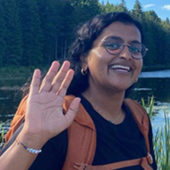Self-Evident Sustainability: From the Jefferson Memorial to JLL
Learn how MSES guided Aparna Chandrashekar (MSES ’23) to a career in built infrastructure sustainability.
 Aparna Chandrashekar (MSES '23) was inching her way through a dusty, dirty crawl space in the depths of the Jefferson Memorial when she came upon an unexpected 40-foot drop. It was 2022, and she was part of a $14.5 million renovation project to restore the roof, repair the stone, and clean the marble of the building honoring the nation's third president.
Aparna Chandrashekar (MSES '23) was inching her way through a dusty, dirty crawl space in the depths of the Jefferson Memorial when she came upon an unexpected 40-foot drop. It was 2022, and she was part of a $14.5 million renovation project to restore the roof, repair the stone, and clean the marble of the building honoring the nation's third president.
“We found that drop and we were like, ‘What the heck is this? Why is this here?’” Chandrashekar said. “I like having to investigate why people thought the way they did back when they were building older buildings.”
That same curiosity with how things are built — and how they can be built better — ultimately led Chandrashekar to Northwestern's Master of Science in Energy and Sustainability (MSES) program, and a career in built environment sustainability. MSES is jointly offered by Northwestern Engineering and the Paula M. Trienens Institute for Sustainability and Energy.
Through its blend of technology, economics, and public policy, MSES taught Chandrashekar to translate sustainability into measurable results for major organizations. Today, Chandrashekar is a portfolio energy and sustainability manager at global commercial real estate and investment management firm JLL. She relies on lessons learned in the MSES program to help reduce the negative impact buildings have on the environment.
Chandrashekar currently oversees roughly 5.5 million square feet of real estate for two different clients. Her goal is to incorporate sustainability into all aspects of her clients' real estate cycles, from green leasing and identifying sustainable design and construction practices to developing energy efficient daily operations.. The benefits of these improvements are often clear and nearly instant, she said.
“If I'm adjusting the set points on different HVAC equipment, I can see how that impacts the building's energy usage on the next utility bill statement,” she said. “It's small changes with immediate payoff.”
The decision to join the MSES program was a bigger change for Chandrashekar that is also paying off.
After earning her bachelor’s degree in civil engineering in 2019, Chandrashekar quickly recognized that her technical expertise alone wasn’t enough to influence the sustainability choices she cared about. Working for a general contractor, she saw firsthand the waste and environmental harm inherent in the construction industry, but she lacked the buy-in to change it.
“In that role, you don't have a seat at the table where the big-picture energy and sustainability decisions are being made,” she said. “You just get plans and have to follow them.”
MSES offered Chandrashekar a clear path toward a seat at that table — to having a tangible influence on decisions that could improve the built environment sector's sustainability efforts.
“I looked for programs that combined engineering and public policy with a focus on the future,” she said. “MSES integrated all of those pillars.”
The program transformed the way she thought about the built environment — from simply constructing spaces to shaping systems that sustain them.
One skill Chandrashekar developed in the program was deeper financial acumen, a skill she didn't realize she would need in her career. She now applies the financial lessons to every technological and program recommendation she makes.
A key to Chandrashekar’s success in the MSES program and now in her career is the inquisitiveness she felt that day in the depths of the Jefferson Memorial. It’s an attitude that suits her well as co-host of The Green Collar Pod, a podcast she launched to highlight different career paths in energy and sustainability. It's also one she recommends to those who might follow in her footsteps into MSES and the sustainability industry.
“There are no dumb questions,” she said. “I do my best to lead with that, to create open spaces for others to also ask questions. I found my voice by asking others for help just so I could understand something better.”